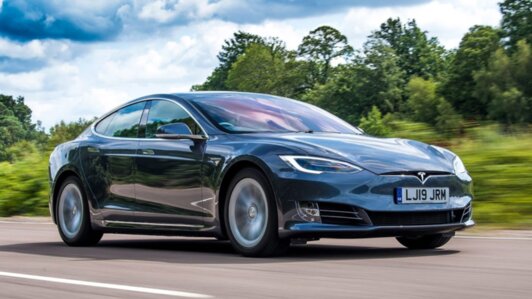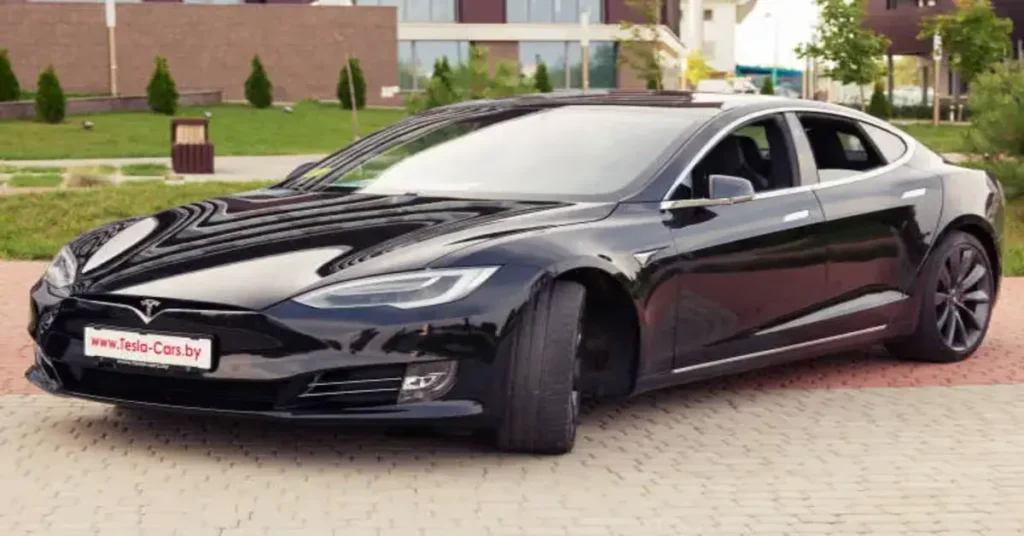
Tesla Model S is one of the long-range vehicles which is packed with a good power-density battery. The Tesla Model S plaid is one of the fastest cars manufactured by Tesla. All the range and the performance of the EVs fully rely on the battery power density. So, do you know about the Tesla Model S battery power density?
Tesla has done important improvements in the battery power density from 165 Wh/kg to 186.21 Wh/kg. The Tesla Model S battery power density can go highest up to 272-296Wh/kg. According to the latest information by Tesla, they have an energy density of 21700 battery system which is approximately higher than the original 18650 Wh battery system.
| Tesla Model S Variant | Battery Power Density (Wh/kg) |
|---|---|
| Tesla Model S (2012-2015) | Approximately 135-150 Wh/kg |
| Tesla Model S (2016-2020) | Approximately 160-180 Wh/kg |
| Tesla Model S (2021-Present) | Approximately 180-200 Wh/kg |
According to the EPA, they have updated the main powertrain, as it applied the new Model X high battery energy density to the vehicles and possessed more power. The whole changes are mainly focussed on the thermal performance for making the temperature more consistent inside the battery pack.
After the first important improvement in the battery pack level energy density from 165 Wh/kg to 186.21 Wh/kg. This has reduced the overall energy capacity from 103kWh to 100kWh. The range of the Model X has a slight decrease in the overall capacity of the battery as it lost 3kWh of battery capacity because of the latest improvement.
We have highlighted some more information related to the battery power density of the Tesla Model X. So, if you are planning to buy Tesla Model S, then you should go through the whole information.
Reports from Twitter
The rumor is, the capacity of the 4680 cells will be
• 98 Watt-hours per cell with first-gen cells in 2022,
• 108 Wh with second-gen cells in 2023,
• 118 Wh with third-gen cells in 2024.
| Tesla Model S Cells Generation | Tesla Model S Battery Power Density (Wh/cell) |
|---|---|
| First-gen (2022) | 98 Wh/cell |
| Second-gen (2023) | 108 Wh/cell |
| Third-gen (2024) | 118 Wh/cell |
2170 cells have 18.23 Wh capacity. So, that’s 98/18.23= 5.38x assuming the same voltage.
Tesla Supplier To Jump 20% In Tesla Model S Battery Power Density By 2030
Before stepping next in the article let me introduce you to the battery supplier of Tesla. Panasonic Energy Co is one of the major suppliers of the Tesla battery. Panasonic Energy is working on new technology to increase the battery density by a fifth nearly by 2030.
| Year | Tesla Model S Battery Power Density (Wh/kg) |
|---|---|
| 2020 | 150 |
| 2025 | 180 (20% increase from 2020) |
| 2030 | 216 (20% increase from 2025) |
You must be thinking about how the new battery technology will affect your vehicles. The new technology can boost the driving range of the Tesla Model S. It can allow manufacturers to create roomie and lighter EVs. There will be no change in the driving range of the vehicles.

As in this era, most of the automakers are focussing on rolling out EVs but Tesla and the major battery supplier like Panasonic keeping their lead in the industry by including more and more technology in the EV battery. You also know battery system is one of the most expensive elements of all EVs. The battery is known as the power deliverer for EVs. Panasonic Energy Co. is looking to achieve higher miles of popularity by mixing individual cells to run at a higher voltage without damaging the battery and the performance.
The company commented that the race among the battery makers will come with more potential and effective additives. He stated that a 20% boost in the battery power density will translate to an energy density of 900Wh/l by comparing an advanced cell of 750wh/l.
Why Tesla’s New Battery Pack Is Important?
According to the report, Tesla will be one of the longest-range production electric vehicles in the world. A new battery pack for Tesla will result in the increased performance of the vehicles and which will be packed with more energy into it.

A result shows that a new 100kWh battery pack can accelerate more quickly and can take you to a long drive without stooping for the charge at any charging station. Once, you’ll start your car with the fully charged battery, then you can easily travel all the long way and come back to the initial stoppage.
The new milestones of Tesla show how continuously Tesla is improving their battery technology to lead the auto industry. Tesla is far ahead of the competitor’s EVs when it comes to including new technology in the battery pack. Tesla always plans to do something extra and beneficial for the Tesla owners which is the main reason for Tesla’s popularity.
| Benefits | Explanation |
|---|---|
| Increased Range | Allows for longer driving distances on a single charge. |
| Faster Charging | Reduces charging time, improving convenience for EV owners. |
| Enhanced Performance | Enables better acceleration and overall vehicle performance. |
| Cost Reduction | Potential to lower the production cost of battery packs and EVs. |
According to the reports by Tesla, the Tesla Model S plaid is one of the fastest EV cars. Thanks to the battery technology of the Telsa make S Plaid is one of the fast accelerating cars including traditional gasoline-powered cars. The Model S can easily travel up to 315 miles on a single charge of battery.
6 years ago, Tesla’s first car Roadster enables owners to travel quite more than 200 miles but when the Tesla Model S was launched it push the drivers to get closer to 300 miles on a single charge of battery. Tesla’s engineers have now crammed more power energy into the same size of the battery. Tesla battery pack is powered with lithium-ion battery cells which discharge to deliver power to the Tesla motor.
Conclusion
Tesla’s major battery producer, Panasonic Energy is including new technology to improve the range of the vehicles. The energy density of the Tesla Model S is up to 272-296 Wh/kg. In the near future, Tesla will upgrade their battery density by 20%.
It is an important improvement in the battery energy density. The energy density of the battery is measured in kilowatt-hours per kilogram for lithium-ion batteries. According to the stats 21700 battery power density is far better than the battery power density of 18650.
FAQs
How many kg of lithium is in a Tesla battery?
Most EV battery has the same battery components. An EV battery has about 8 kg of lithium, 20 kg of manganese, and 14 Kg of cobalt. The battery components may vary depending on the battery size and battery power. As an example, the Tesla Model S battery contains around 62.6 kg of lithium.
What is the Tesla battery made of?
Tesla standard-range vehicles use the battery pack of lithium-iron-phosphate( LFP) cathodes. The new battery chemistry of the Tesla is free from cobalt and nickel.
Who is the largest supplier of lithium?
As the demand for lithium is constantly increasing because of the growing demand for electric vehicles. Generally, most electric vehicles use lithium in their battery pack to enhance the performance of the EVs. The three largest producers of lithium are China, Chile, and Australia.
Posts Related to Electric Cars and Batteries
- Tesla Model 3 Battery Consumption – Complete Guide 2024
- Tesla Model S Battery Failure -A Complete Guide 2024
- Tesla Charging Adapter Experience? A Complete Unbiased Guide 2024, Real Experience
- Tesla Model S Battery Configuration
- Cheapest Electric Car Battery Replacement Cost
- Tesla Only Charging At 16 amps
- Tesla Knocking Sound When Accelerating – Complete Guide
- Model 3 Clicking Noise When Accelerating
- Tesla Beeping Sound While Parked – (Tesla Model 3, Model X, Model Y, Model S)
- Tesla Model S Wobble Problems And Solution- Complete 2024 Guide

